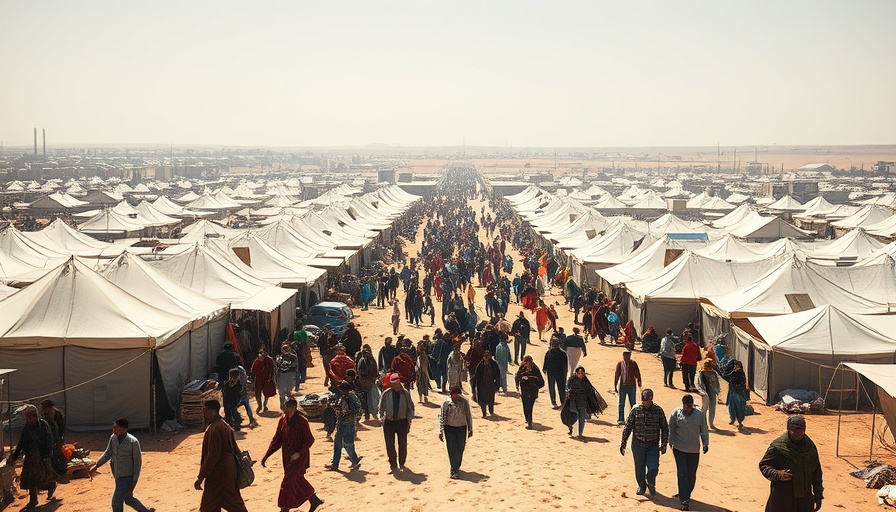
Unraveling the Impacts of Israel's Ambitious Gaza Strategy
The Israeli cabinet's recent decision to move forward with plans to capture the entire Gaza Strip is a harbinger of escalating humanitarian crises. Underlines the continuing complexity of the Israel-Palestine conflict, this ambitious military operation is poised to alter the lives of countless civilians who are already suffering from the repercussions of an extended conflict. As Israel aims to thwart Hamas's grip and secure the release of hostages, the envisioned strategy invokes not only military considerations but a crucial humanitarian aspect that remains to be satisfactorily addressed.
In 'Israeli cabinet approves plans to capture all of the Gaza Strip,' the discussion dives into Israel's controversial military strategies, prompting us to analyze their broader implications for humanitarian conditions and international diplomacy.
The Humanitarian Dilemma: Displacement and Risk
One of the most concerning elements of the Israeli plan is its emphasis on relocating a significant portion of Gaza's population. This shift echoes the historical precedents of forced displacements during conflicts, raising profound questions about the humanitarian implications. When families are uprooted and moved to uncertain areas, the risk of exacerbated psychological trauma and displacement-related hardships becomes a stark reality. Such outcomes could further entrench societal divisions and conflicts—a vicious cycle that the international community must keenly observe.
International Response and Humanitarian Law
The international community has been vocal in its concern regarding the Israeli government's plan. UN Secretary-General Antonio Guterres expressed alarm over the potential humanitarian fallout, underscoring the importance of adhering to established principles of humanitarian law. As states and organizations grapple with how to broker peace while safeguarding the rights of civilians, the lines of accountability must be clear. Each decision taken in this context reverberates through the geopolitical landscape, necessitating that national strategies remain compatible with international legal expectations.
Echoes of History: Lessons from Conflict
This current scenario mirrors previous instances where military initiatives led to significant civilian casualties and long-term ramifications. Historical parallels can be drawn from other conflict zones where similar strategies were employed, often resulting in widespread discontent, instability, and emerging humanitarian crises. In a region already characterized by fragility, the sensitivity of this backdrop warrants careful examination and nuanced discussions.
Public Sentiment and Social Movements
As the new military strategy unfolds, public sentiment among Israelis and Palestinians plays an influential role. Protests erupting outside the Israeli parliament indicate a growing dissent against the government’s decisions, with families of hostages calling for reconsideration of military actions that jeopardize their loved ones. This interplay between public opinion, government actions, and the fate of hostages is critical in understanding the broader implications of governance and social responsibility within regions afflicted by conflict.
Insights for the Future: Predicting Outcomes
For geopolitical analysts and those tracking African politics and crises, the developments in Gaza may provide crucial insights into how similar scenarios could unfold elsewhere. If lessons from previous international conflicts are anything to go by, the potential for increased regional instability and humanitarian fallout should not only be anticipated but strategically addressed. Moreover, understanding how resilient communities adapt in times of crises can offer a roadmap for intervention strategies that prioritize both humanitarian aid and peacebuilding.
The Call for Constructive Engagement
As we navigate the complexities of ongoing conflicts, the responsibility lies with professionals, policymakers, and civil society to convert these discussions into meaningful actions. It is clear that only through concerted efforts—rooted in empathy and a shared understanding of human dignity—can a path toward resolution and reconciliation be achieved. Engaging critically with developments from Algeria to Nigeria, and from Kenya to South Africa, creates a pertinent backdrop for analyzing how international responses can mitigate crises.
In light of these events, it is imperative for the global community to elevate discussions on humanitarian needs and foster collaborative frameworks that emphasize the restoration of peace, dignity, and justice for all. By exploring the nuances of African current events, professionals can better equip themselves to influence positive change in situations like the one currently unfolding in Gaza.
 Add Row
Add Row  Add
Add 




Write A Comment